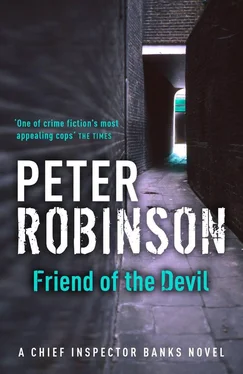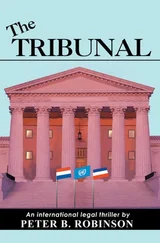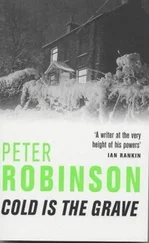“Yes, ma’am,” said Templeton, tight-lipped.
Everyone was silent for a few moments, then Gervaise asked Banks what was next.
“We have a list of possibles,” said Banks. “Joseph Randall, Stuart Kinsey, Zack Lane, Jamie Murdoch and Malcolm Austin. And the serial-killer angle,” he added, looking at Templeton. “I think the next thing we need to do is have another go at all our suspects, a bit harder than we have before, and see if we can’t find a chink in someone’s armor.”
Someone knocked at the door, and one of Stefan Nowak’s colleagues delivered an envelope to him. There was silence while he opened it. When he had finished, he glanced over at Banks. “That might not be necessary,” he said. “Remember I said our killer might not be as smart as you think? Well, according to the lab, the DNA found in the semen sample on Hayley Daniels’s thigh is the same as the saliva sample freely given by Joseph Randall. It looks very much as if we’ve got a positive match.”
Thanks for taking the trouble to come down and see me,” said Les Ferris, the researcher who said he had information, when Annie appeared in his office late that afternoon. “It’s almost knocking-off time, and I don’t get out much,” he went on, picking up his rumpled tweed jacket from the back of his chair, “so why not let me treat you to a pint? Or a cup of tea, if that’s your poison?”
Annie thought for a moment. She’d fallen off the wagon last night with disastrous consequences, but she was feeling better now, and one pint wouldn’t do her any harm. Besides, the office was a mess and smelled of overripe banana skins. “Okay,” she said, “you’re on. A pint it is.”
Les Ferris smiled, showing stained and crooked teeth. He was a bald, roly-poly sort of man with a red face, white whiskers and sad eyes.
It was a beautiful evening in Scarborough, the sort you didn’t often get before the holiday season — or even during it, for that matter — and the locals were taking full advantage. Couples walked hand in hand on the prom and families with young children, or pushing prams, lingered at the edge of the sea, kids throwing pebbles at the waves. One brave man even rolled up his trouser legs and tested the water, but he didn’t last more than a few seconds. Annie could smell salt and seaweed and hear the gulls screeching overhead. For a second, they made her think of Lucy Payne’s body, and she shivered.
“Cold?” asked Ferris.
Annie smiled. “No,” she said. “Someone just walked over my grave.”
Ahead, where the high promontory of Scarborough Castle bulged out and brooded over the bay, Annie could see the waves smashing against the seawall, the salt spray flying high. Ferris picked a cozy pub on a corner near Marine Drive. It looked over the harbor. The tide was out and a few white, red or green fishing boats rested on the wet sand. One man in a blue jersey was painting his hull. The pub was a Jennings house with guest beers, and Annie chose a pint of Cock-a-Hoop. Ferris reached for his cigarettes after he had set the drinks down on the scratched table. “Do you mind?” he asked.
“Not at all,” said Annie. The place already reeked of smoke and several people at nearby tables were smoking. “Make the best of it while you can.”
“I’ve tried to stop about twenty times,” said Ferris, “but somehow I just can’t seem to manage it. I’m about to turn sixty-five next month, so at this point I think I’d better just resign myself to my fate, don’t you?”
That wasn’t what Annie had meant. She had been referring to the smoking ban coming into effect in July. But it didn’t matter. “Sixty-five isn’t old,” she said. “You might just as easily live to be ninety. If you stop.” She raised her glass. “Cheers. To ninety.”
“Cheers. I’ll drink to that.” After he drank, Ferris inhaled deeply on his cigarette.
“You said you had something to tell me,” Annie said.
“Yes. I’m not really sure if any of it’s relevant, but when I heard about the identity of your victim it rang a bell.”
“I’m hardly surprised,” said Annie. “Lucy Payne was quite notorious in her day.”
“No, it’s not that. Not Lucy Payne.”
“Perhaps you’d better start at the beginning?”
“Yes,” said Ferris. “Yes, perhaps I had. I haven’t always been a humble researcher, you know,” he went on. “I’ve put in my time on East Yorkshire CID, as it was then. I might be past it now, but I was quite the dashing young detective at one time.” His eyes twinkled as he spoke.
“I’ll bet you were,” said Annie, hoping a bit of flattery might help him get a move on. She had no particular plans for the evening, but she was looking forward to a quiet night in her room watching TV.
“Not that we ever got many murders along this stretch of coast,” he went on, “which is probably why I thought of it. People say I’ve got a bee in my bonnet. For some reason, though, it’s always haunted me. Perhaps because it all ended up as mysterious as it began.”
“What?” said Annie. “You’ve got me intrigued.”
“A case I worked on back in 1989. A mere callow youth of forty-seven, I was then. I’d just made DS. None of your accelerated promotion rubbish in those days. Back then, you earned your stripes.”
“So I’ve heard,” Annie said.
“Aye, well, not that there aren’t plenty of good men around these days. A few women, too,” he added hastily.
“This 1989 case,” Annie said, lest he put his foot even farther in his mouth. “What exactly brought it to your mind when you heard about Lucy Payne?”
“I was just getting to that.” Ferris drained his pint. “Another?”
“Not for me. I’m driving,” said Annie. “But let me get you one.”
“Aye, all right,” Ferris said. “Women’s lib and all that. I’ll have another pint of Sneck-Lifter, please.”
“Sneck-Lifter?”
“Aye. I know it’s strong, but I don’t have far to go. Not driving, like you.”
Annie went to the bar and asked for a pint of Sneck-Lifter. The barmaid smiled and pulled it for her. She jerked her head over at Ferris. “It’ll take more than this to lift his sneck,” she said.
Annie laughed. “Luckily,” she said, “I won’t be around to find out.”
The barmaid laughed with her, handed Annie her change and said, “Cheers, love.”
Back at the table, Ferris thanked her for the pint and stared out of the window toward the sea. “Aye,” he said. “September 1989. Nasty business it was. I was working out of Whitby then, way you are now. Mostly quiet apart from a few pickpockets in high season, the occasional pub brawl, break-in or domestic incident.”
“What happened?” Annie asked him.
“Well, that’s just it,” Ferris said, scratching his chin. “We never rightly did find out. It was all nobbut speculation and conjecture. Based on what few facts we had, of course. We did our best. Anyroad, it’s stayed with me all these years.”
Annie sipped some beer. Might as well relax and let him tell it in his own time, she thought as she noticed the shadows lengthening outside. “I’m sure you did,” she said. “But what makes you think it’s linked to Lucy Payne’s murder?”
“I never said that it was. It’s just a funny coincidence, that’s all, and if you’re as good a copper as you’re supposed to be, you won’t trust coincidence any more than I do.”
“I don’t,” said Annie. “Go on.”
“First off, we don’t get many murders in these parts, and you tend to remember all of them. We got even fewer back then. It started when a local bloke, a cabinetmaker called Jack Grimley, disappeared one night after leaving a pub called the Lucky Fisherman. A couple of days later his body washed up on the beach over Sandsend way.”
Читать дальше












